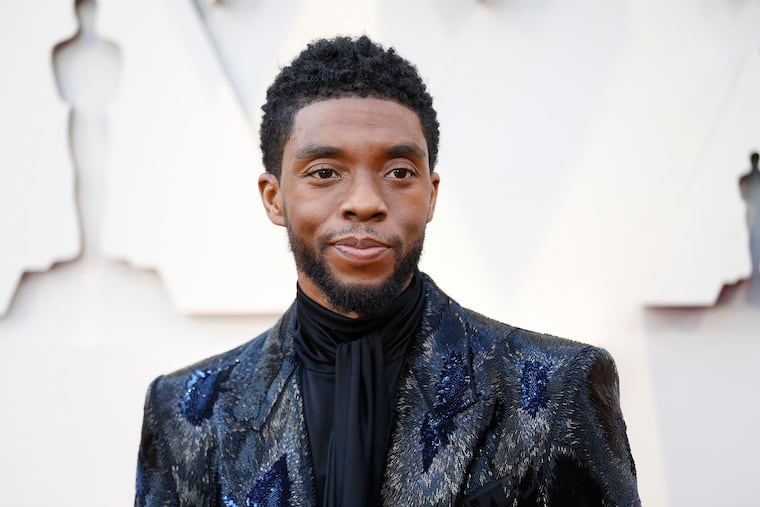What happens when a Black superhero dies?
With few on-screen portrayals of African Americans, the death of actor Chadwick Boseman, who played the Black Panther, hit especially hard. A sequel helps fans find their way through the grief.

Chadwick Boseman was a real-life superhero.
He played Thurgood Marshall; he played Jackie Robinson; he played James Brown; he played the Black Panther. Those who knew and loved the actor, who died of colon cancer in 2020 at age 43, would often say he was even more wonderful off-screen than on it. Consequently, for many, Boseman’s death felt like the end of the world. It left many wondering, what do you do when a Black superhero dies? Black Panther: Wakanda Forever goes to great lengths to answer that question.
Serendipitously, if not providentially, the film was always intended to revolve around grief. As the film’s director, Ryan Coogler, revealed during an interview with Inverse, its original script centered on Boseman’s character, King T’Challa, still processing the loss — and return — of half the universe’s population in the two most recent Avengers films.
Following Boseman’s untimely death, Coogler decided the film would confront the loss of Boseman’s character in ways that mirrored the loss of Boseman himself. Doing so would allow a grieving cast to honor his legacy without having to enlist another actor to replace him.
This would not be the first time comic fans would have to reckon with the death of a beloved hero. Such notable characters as Superman, Captain America, and Wolverine have all met their demise. Notwithstanding, the Black Panther’s death is different, particularly considering that he is the first mainstream superhero to hail from Africa.
» READ MORE: 5 ways ‘Wakanda Forever’ takes a new look at superheroes
Losing Boseman carried a greater weight for many fans because of the dearth of representation of African Americans in film. As Jamil Smith wrote for Time, “relating to characters onscreen is necessary not merely for us to feel seen and understood, but also for others who need to see and understand us. When it doesn’t happen, we are all the poorer for it.”
When asked to connect his portrayal of the virtually indestructible character Luke Cage to the social climate in the country in 2016, the actor Mike Colter told Ben Childs of the Guardian, “Every day I look in the paper — always someone getting gunned down, unarmed … It’s too close to home for me because it doesn’t seem as though it’s getting any better …”
By then, names like Trayvon Martin, Eric Garner, Rekia Boyd, Michael Brown Jr., Sandra Bland, and Tamir Rice had become seared in our collective consciousness. Day by day, the nation relived the tragedy of their heinous deaths with each new headline. Each name forced the nation to confront not only those tragic deaths but also the idea that there were countless others yet to be memorialized in hashtags. Thus, in his 2016 review of the Netflix series Luke Cage, Childs described Power Man — a bulletproof Black man — as the “superhero America needs now.”
If much has changed since Boseman led us in rousing chants of “Wakanda Forever” following the 2018 release of Black Panther, even more has changed in the six years since Colter emerged as Luke Cage. If a bulletproof Black man was the hero America needed in 2016, in 2022, America needs a hero whose legacy reminds us that our sum is greater than its parts — that we can continue on in his absence. That life can go on, it must go on, in the midst of heartache.
» READ MORE: With an Indigenous antihero, representation takes a step forward in ‘Wakanda Forever’ | Opinion
Wakanda Forever showcases the futility of eschewing community and the rituals that sustain it. It highlights the need for collective resolve to muster the fortitude to combat pervasive external threats and existential crises. Thus, Wakanda Forever is a promise, a promise that we can continue on in the face of unimaginable hardship and inescapable grief. It is the embodiment of the philosophy known as Ubuntu, which we translate into English to say, “I am because we are; because we are, I am.” Wakanda can continue into the future because its people will. Hopefully, it will inspire us to continue on as well.
Timothy N. Welbeck is the director of the Center for Anti-Racism at Temple University.